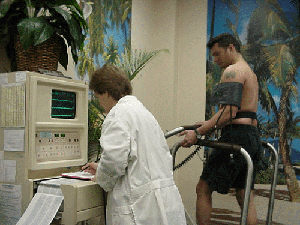
The heart rate is monitored until it reaches between 85-100% of the maximum heart rate, (220 minus the patient's age), and the results are evaluated by a Cardiologist. Based on the information obtained from this test, more specialized cardiac studies may be recommended, (e.g., Nuclear Imaging Scans). If the patient develops any problems or serious symptoms during the test, it can be stopped immediately.
The patient has electrodes placed on his or her torso, (which is also used to do an EKG), and walks/runs on a treadmill. The treadmill is connected to a computer that changes the speed and incline at which the patient must walk/run. The standard protocol for the test is as follows:
- 3 Minutes at 1.7 mph with 10% elevation
- 3 Minutes at 2.5 mph with 12% elevation
- 3 Minutes at 3.4 mph with 14% elevation
If a patient cannot walk on a treadmill, other pharmacological medication can be given for the exercise portion of the test to give similar results as the heart with activity.
A resting EKG is useful, but it does not tell us anything about how heart behaves under more stressful conditions. By directly observing your heart's behavior during exercise, we get a much more detailed picture of what is going on.